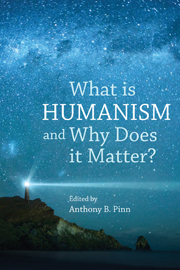Book contents
- Frontmatter
- Contents
- Preface
- Acknowledgments
- Part I What Is Humanism?
- 1 Humanism as Experience
- 2 Humanism as Guide to Life Meaning
- 3 Humanism as a Meaning Frame
- Part II Why Doest Humanism Matter?
- Part III What Do We Do With Humanism?
- Appendix: Humanist Manifestos
- Notes
- Select Bibliography
- Contributors
- Index
1 - Humanism as Experience
from Part I - What Is Humanism?
- Frontmatter
- Contents
- Preface
- Acknowledgments
- Part I What Is Humanism?
- 1 Humanism as Experience
- 2 Humanism as Guide to Life Meaning
- 3 Humanism as a Meaning Frame
- Part II Why Doest Humanism Matter?
- Part III What Do We Do With Humanism?
- Appendix: Humanist Manifestos
- Notes
- Select Bibliography
- Contributors
- Index
Summary
Of all things the measure is man, of the things that are, that [or “how”] they are, and of things that are not, that [or “how”] they are not.
—ProtagorasI am a man, nothing human is alien to me.
—TerenceWHAT IS HUMANISM?
When visiting with humanists in their varied habitats, I often hear arguments about world-shaking ideas. I see little of the acts that ought to follow from them in personal and social life. Perhaps all this talk is a search for stability in a chaotic world; perhaps it is inevitable, given our roots in the academy and the pulpit. But still I am haunted by these repetitions of “metaphysical” arguments like the being or non-being of the deity, or institutional arguments like whether humanism is secular or religious. There is, too, a less than critical liberal politics most of us share that at times borders on self- righteousness.
I know that reason easily turns into rationalism and that acts are more elusive than words. Nor is humanism immune to the Platonic temptation, the escape to the “heaven beyond the heavens.” Of course, I take pleasure in words and word-games—I am a philosopher by training after all! At the same time, I am a pragmatist. So I ask: What difference to the world we live in does our talk make? What practical consequences does it have for me and for others? Soon enough, my humanism becomes uncomfortable.
- Type
- Chapter
- Information
- What is Humanism, and Why Does it Matter? , pp. 2 - 27Publisher: Acumen PublishingPrint publication year: 2013

